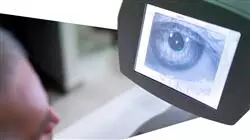University certificate
The world's largest faculty of medicine”
Introduction to the Program
Bet on TECH! You will perform comprehensive evaluations and provide high quality, specialized treatment in Systemic Pathology in children"

Conditions such as diabetes, genetic diseases or metabolic disorders can manifest with symptoms in children's eyes, highlighting the importance of a comprehensive ophthalmologic evaluation. For this reason, the specialist should monitor pediatric visual conditions and recognize the close relationship between ocular health and systemic development, promoting optimal vision and healthy growth in childhood.
This Postgraduate diploma will provide the physician with the tools and strategies to effectively manage real situations. Therefore, it will address from the evaluation and management of the child with vision problems, to the diagnosis and treatment of pathologies such as conjunctivitis, intermittent amblyopia, epiphora and acute strabismus. It will also focus on retinopathy of prematurity, papillary effacement, pediatric anisocoria and papillary pallor.
Likewise, he will delve into phacomatosis and neurofibromatosis, highlighting their ophthalmic manifestations, to then investigate pediatric tumor pathology, both in the central nervous system and in other types of tumors, such as leukemia and neuroblastoma. In addition, mitochondrial pathology and neurometabolic disorders
will be discussed.
The specialist will also evaluate children with low vision, highlighting strategies to optimize their quality of life. And he will approach Cerebral Visual Impairment (CVI), visual maturational delay, prematurity syndrome and infantile cerebral palsy. Finally, it will delve into dyslexia, crossed laterality and other disorders that can affect the vision and development of the pediatric patient.
TECH will provide the graduate with a comprehensive and detailed program that can be taken conveniently from any location and at any time. In this way, the student will have the freedom to establish his own schedule, since he will only need an electronic device with Internet access. It will also have innovative multimedia resources and an avant-garde pedagogical methodology, Relearning, which implies the repetition of the most relevant aspects to guarantee effective learning.
With this Postgraduate diploma you will analyze the close relationship between children's eye health and systemic development"
This Postgraduate diploma in Pediatric Ophthalmology in Visual Development and Systemic Pathology contains the most complete and up-to-date scientific program on the market. The most important features include:
- The development of case studies presented by experts in Pediatric Ophthalmology in Visual Development and Systemic Pathology
- The graphic, schematic and eminently practical contents of the book provide scientific and practical information on those disciplines that are essential for professional practice
- Practical exercises where self-assessment can be used to improve learning
- Its special emphasis on innovative methodologies
- Theoretical lessons, questions to the expert, debate forums on controversial topics, and individual reflection assignments
- Content that is accessible from any fixed or portable device with an Internet connection
Update with TECH on eurometabolic vision disorders in children, which appear after genetic changes inherited from unaffected parents or a new gene abnormality"
The program’s teaching staff includes professionals from the sector who contribute their work experience to this training program, as well as renowned specialists from leading societies and prestigious universities.
The multimedia content, developed with the latest educational technology, will provide the professional with situated and contextual learning, i.e., a simulated environment that will provide immersive education programmed to learn in real situations.
This program’s design focuses on Problem-Based Learning, through which the professional must try to solve the different professional practice situations that arise during the academic program. For this purpose, the students will be assisted by an innovative interactive video system created by renowned and experienced experts.
You will delve into Cerebral Visual Impairment (CVI), also known as central visual disturbance, a disorder caused by damage to the areas of the brain that process vision"

You will address Juvenile Idiopathic Arthritis (JIA) and how it can affect the vision of younger patients, through the most innovative multimedia resources"
Why study at TECH?
TECH is the world’s largest online university. With an impressive catalog of more than 14,000 university programs available in 11 languages, it is positioned as a leader in employability, with a 99% job placement rate. In addition, it relies on an enormous faculty of more than 6,000 professors of the highest international renown.

Study at the world's largest online university and guarantee your professional success. The future starts at TECH”
The world’s best online university according to FORBES
The prestigious Forbes magazine, specialized in business and finance, has highlighted TECH as “the world's best online university” This is what they have recently stated in an article in their digital edition in which they echo the success story of this institution, “thanks to the academic offer it provides, the selection of its teaching staff, and an innovative learning method aimed at educating the professionals of the future”
A revolutionary study method, a cutting-edge faculty and a practical focus: the key to TECH's success.
The most complete study plans on the university scene
TECH offers the most complete study plans on the university scene, with syllabuses that cover fundamental concepts and, at the same time, the main scientific advances in their specific scientific areas. In addition, these programs are continuously being updated to guarantee students the academic vanguard and the most in-demand professional skills. In this way, the university's qualifications provide its graduates with a significant advantage to propel their careers to success.
TECH offers the most comprehensive and intensive study plans on the current university scene.
A world-class teaching staff
TECH's teaching staff is made up of more than 6,000 professors with the highest international recognition. Professors, researchers and top executives of multinational companies, including Isaiah Covington, performance coach of the Boston Celtics; Magda Romanska, principal investigator at Harvard MetaLAB; Ignacio Wistumba, chairman of the department of translational molecular pathology at MD Anderson Cancer Center; and D.W. Pine, creative director of TIME magazine, among others.
Internationally renowned experts, specialized in different branches of Health, Technology, Communication and Business, form part of the TECH faculty.
A unique learning method
TECH is the first university to use Relearning in all its programs. It is the best online learning methodology, accredited with international teaching quality certifications, provided by prestigious educational agencies. In addition, this disruptive educational model is complemented with the “Case Method”, thereby setting up a unique online teaching strategy. Innovative teaching resources are also implemented, including detailed videos, infographics and interactive summaries.
TECH combines Relearning and the Case Method in all its university programs to guarantee excellent theoretical and practical learning, studying whenever and wherever you want.
The world's largest online university
TECH is the world’s largest online university. We are the largest educational institution, with the best and widest online educational catalog, one hundred percent online and covering the vast majority of areas of knowledge. We offer a large selection of our own degrees and accredited online undergraduate and postgraduate degrees. In total, more than 14,000 university degrees, in eleven different languages, make us the largest educational largest in the world.
TECH has the world's most extensive catalog of academic and official programs, available in more than 11 languages.
Google Premier Partner
The American technology giant has awarded TECH the Google Google Premier Partner badge. This award, which is only available to 3% of the world's companies, highlights the efficient, flexible and tailored experience that this university provides to students. The recognition as a Google Premier Partner not only accredits the maximum rigor, performance and investment in TECH's digital infrastructures, but also places this university as one of the world's leading technology companies.
Google has positioned TECH in the top 3% of the world's most important technology companies by awarding it its Google Premier Partner badge.
The official online university of the NBA
TECH is the official online university of the NBA. Thanks to our agreement with the biggest league in basketball, we offer our students exclusive university programs, as well as a wide variety of educational resources focused on the business of the league and other areas of the sports industry. Each program is made up of a uniquely designed syllabus and features exceptional guest hosts: professionals with a distinguished sports background who will offer their expertise on the most relevant topics.
TECH has been selected by the NBA, the world's top basketball league, as its official online university.
The top-rated university by its students
Students have positioned TECH as the world's top-rated university on the main review websites, with a highest rating of 4.9 out of 5, obtained from more than 1,000 reviews. These results consolidate TECH as the benchmark university institution at an international level, reflecting the excellence and positive impact of its educational model.” reflecting the excellence and positive impact of its educational model.”
TECH is the world’s top-rated university by its students.
Leaders in employability
TECH has managed to become the leading university in employability. 99% of its students obtain jobs in the academic field they have studied, within one year of completing any of the university's programs. A similar number achieve immediate career enhancement. All this thanks to a study methodology that bases its effectiveness on the acquisition of practical skills, which are absolutely necessary for professional development.
99% of TECH graduates find a job within a year of completing their studies.
Postgraduate Diploma in Pediatric Ophthalmology in Visual Development and Systemic Pathology
Pediatric ophthalmology is a medical specialty dedicated to the visual health of children and adolescents. If you want to obtain the necessary knowledge to perform in this field, you came to the right place. At TECH Global University you will find the Postgraduate Diploma in Pediatric Ophthalmology in Visual Development that will help you achieve your goals. This program, taught 100% online, focuses on training you in the diagnosis and treatment of pediatric ocular conditions, considering their relationship with the systemic health of young patients. As you progress through the curriculum, you will explore all aspects of pediatric ophthalmology, from normal visual development to common and rare ocular conditions in children or adolescents. Thus, you will be equipped to address a wide range of visual problems in young patients. Our program includes evaluation of systemic health and its relationship to ocular conditions in children. This will allow you to provide more comprehensive and effective care to your pediatric patients.
Learn about pediatric ophthalmology in visual development and systemic pathology
Pediatric ophthalmology is a steadily growing specialty, and the demand for experts in pediatric and adolescent vision care is on the rise. With this Postgraduate Diploma, you will be able to work in pediatric hospitals or ophthalmology clinics, allowing you to contribute to the visual and systemic well-being of the very young. As you progress through the curriculum, you will learn to identify and diagnose visual problems early in life, which is essential for effective treatment. In addition, you will master the ophthalmologic techniques and procedures necessary for the care of children. Likewise, we will keep you abreast of the latest technologies and advances in pediatric ophthalmology, where you will learn to use state-of-the-art diagnostic and treatment equipment. From this, you'll be ready to care for the vision and health of the next generation - enroll now, together, we'll ensure that children get a healthy start in their visual lives!







